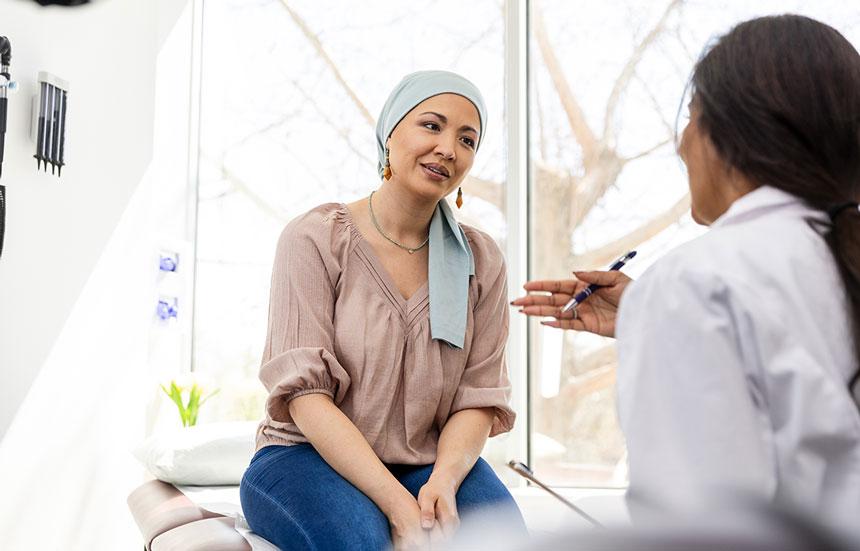Early Onset Cancer is Rising Among Younger Adults

Cancer has always been considered a disease of older adults. As you age, you’re exposed to more and more carcinogens such as chemical toxins, ultraviolet radiation and cigarette smoke, which damage cells. Damaged cells are supposed to self-destruct, but some don’t; instead, they begin accumulating in the body around age 50. This raises the risk for cancer, which is why historically, the median age for cancer diagnoses has been 66, according to the National Cancer Institute.
However, American Cancer Society (ACS) has documented an annual one to two percent rise in overall cancer among younger adults, according to a study published in The Lancet Public Health. And another group of researchers are predicting a 30 percent increase in early onset cancers between 2019 and 2030, according to a study published in BMJ Oncology.
“We’ve known for a while that Americans are developing cancer at younger ages. In fact, several years ago, early detection screening guidelines for colorectal cancer were shifted from beginning at age 50 to beginning at 45,” says Bernard Kaminetsky, MD, medical director, MDVIP.
Which Cancers are Rising Among Younger Adults
In ACS’ study, they looked at 34 different cancers and found 17 of them were rising substantially among Generation X and Millennial adults when compared to adults in the Baby Boomer and Silent Generations. Furthermore, rates for nine of the 17 cancers are declining among Baby Boomer and Silent Generation adults. Here’s the list of rising cancers.
- Cardia gastric
- Small intestine
- Estrogen receptor-positive breast
- Ovary
- Liver and intrahepatic bile duct in women
- Oral and pharynx cancers in women (unrelated to human papilloma virus)
- Colon and rectal
- Uterine corpus
- Gallbladder and other biliary
- Kidney and renal pelvis
- Pancreas
- Myeloma
- Non-cardia gastric
- Testis
- Leukemia
- Anus in men
- Kaposi sarcoma in men
What’s Causing Early-Onset Cancer?
Researchers don’t fully understand why these early-onset cancers are increasing. However, a handful of theories have emerged.
Yale Medicine suggests that many younger adults aren’t adhering to early detection screening schedule, even if they have a family history of a particular cancer. Family history is a key factor in early diagnosis. But many younger adults don’t seek testing until they begin experiencing symptoms. And while early detection screenings don’t prevent cancer, they help find cancers at earlier stages. Cancer found in its precancerous or early stage is generally easier to treat and has better outcomes.
University of Chicago Medicine believes healthcare inequities may be causing delays in getting early detection screenings and limiting timely treatment. These generations also have had unhealthy changes in their gut microbiome, raising the risk for gastrointestinal cancers. Altered gut microbiome are probably the result of a diet laden with processed foods, overexposure to microplastics and/or overuse of substances like alcohol. An unhealthy gut, along with stress, lack of physical activity and obesity triggers an inflammatory response. Inflammatory cells have powerful connection to cancer. Many Gen X and Millennial also women are having (or had) later-in-life births and fewer children. This reproductive history differs from that of the typical Baby Boomer and Silent Generation women and may raise the risk for hormonal related cancers like breast, ovarian and endometrial.
Memorial Sloan Kettering pointed out another variable -- the obesity epidemic, as 10 of the 17 cancers with elevated early onset rates are obesity related. Keep in mind, obesity promotes inflammation.
“Unprotected sex is also a contributing factor. Men’s anal cancer is often associated with human papilloma virus (HPV) and Kaposi sarcoma is usually related to human immunodeficiency virus (HIV),” says Kaminetsky.
Lowering Your Risk for Cancer
- Quit tobacco – as it has ties to lung, larynx, mouth, esophageal, throat, bladder, kidney, liver, stomach, pancreas, colorectal and cervical cancers, and acute myeloid leukemia.
- Limit Alcohol – as it has ties to mouth, throat, larynx, esophageal, colorectal, liver and breast (in women) cancers.
- Exercise – as a sedentary lifestyle has ties to colon, endometrial and lung cancers.
- Eat a healthy diet – as it has ties to colorectal, lung, prostate and uterine cancers.
- Manage your weight – being overweight or obese has ties to esophageal, breast (post-menopausal women), colorectal, uterus, gallbladder, stomach, kidneys, liver, ovarian, pancreatic, thyroid, brain cancers and multiple myeloma.
- Practice safe sex – as sexually transmitted infections have ties to cervical, vaginal, vulvar, anal and penile cancers.
“Most importantly, work with your primary care physician,” says Kaminetsky. “They can help you live a healthy lifestyle and stay on top of early detection screenings.”
If you don’t have primary care physician, consider joining an MDVIP-affiliated practice. MDVIP-affiliated physicians have more time to help you in your pursuit of a healthier lifestyle. Find a physician near you and begin your partnership in health »


